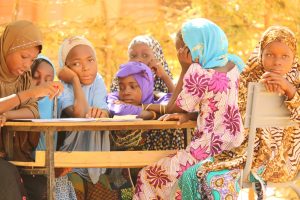By William Beeker

Source: Wells Bring Hope
The Covid-19 pandemic has highlighted many systemic problems in societies around the world, but maybe none so clearly as those in our education systems. Here in the US, adapting to the challenges presented by the pandemic was difficult, but manageable. Many schools were able to implement some form of online learning because things like computers, cell phones, and internet access are nearly ubiquitous here. Remote learning had its downsides, but overall, we fared better than many countries.
In Niger, the arrival of the pandemic meant 3.7 million students suddenly found their education put on hold with no clear end or alternative insight. A year and a half later, with students finally back in classrooms, Niger has the opportunity to reassess its educational system. The Covid-19 pandemic exacerbated longstanding problems in the educational system and made clear the norm was no longer acceptable.
With such a delicate education system, Niger and its international supporters had to go to great lengths to mitigate the effects of the pandemic. For example, Global Partnership Enterprises launched a grant to help bulwark Niger’s education system against the pandemic and improve its resilience in the long term. The program, which will end in December, includes providing thousands of handwashing kits to schools, distributing educational and refresher materials, training teachers at the primary level, and starting a school feeding program. Solutions like these provide a silver lining to what has otherwise been a harsh year and a half. They also identify key weaknesses in Niger’s education system that mostly preceded the pandemic:
- Lack of running water makes sanitation difficult
- Classrooms and students lack educational resources
- Teachers are undertrained and too few
- Hunger prohibits kids from attending class
Increased government spending and foreign aid have helped Niger make big gains in school enrollment and completion, but work will need to be done outside classrooms to make school more accessible for all Nigeriens.
Wells Bring Hope can play a crucial role by providing villages with running water, allowing for better hygiene and irrigation for farming, and giving villagers more robust, weather-proof sources of food. Both factors allow students to stay in class and keep schools open. When a well is drilled, girls and women no longer have to trek miles each day to fetch drinking water, and they are freed to attend school, helping to close the gender gap in education.
Additionally, the microfinance training Wells Bring Hope offers can give women a means to support themselves. When women have more freedom and autonomy within their communities, education becomes more feasible for the most vulnerable, and child marriages may be reduced. The silver lining in a massive disruption like the Covid-19 pandemic is the chance to see problems with a fresh perspective, explore new solutions, and find ways to move above and beyond the former status quo.


